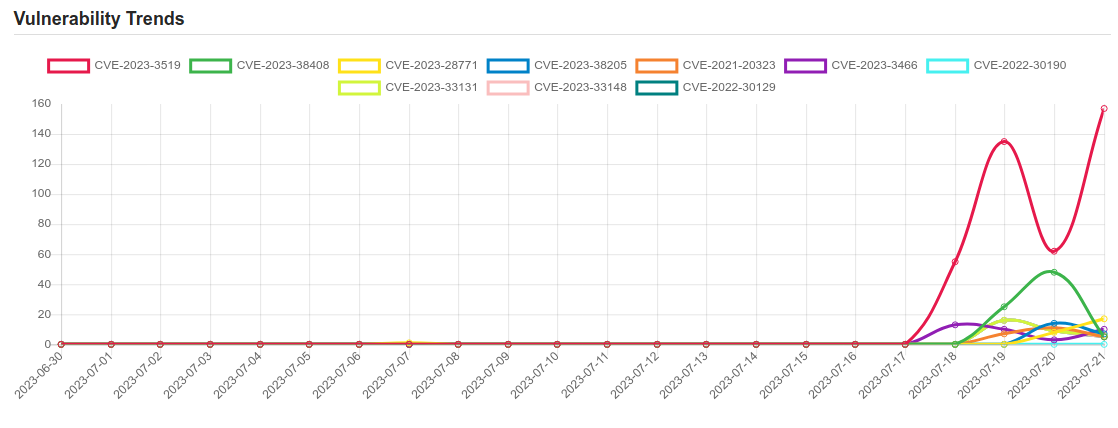Daily Vulnerability Trends: Sat Jul 22 2023

| CVE NAME | CVE Description |
| CVE-2021-20323 | A POST based reflected Cross Site Scripting vulnerability on has been identified in Keycloak. |
| CVE-2022-30190 | Microsoft Windows Support Diagnostic Tool (MSDT) Remote Code Execution Vulnerability. |
| CVE-2023-33145 | Microsoft Edge (Chromium-based) Information Disclosure Vulnerability |
| CVE-2023-24892 | Microsoft Edge (Chromium-based) Webview2 Spoofing Vulnerability |
| CVE-2023-2163 | No description provided |
| CVE-2023-3467 | Privilege Escalation to root administrator (nsroot) |
| CVE-2020-7205 | A potential security vulnerability has been identified in HPE Intelligent Provisioning, Service Pack for ProLiant, and HPE Scripting ToolKit. The vulnerability could be locally exploited to allow arbitrary code execution during the boot process. **Note:** This vulnerability is related to using insmod in GRUB2 in the specific impacted HPE product and HPE is addressing this issue. HPE has made the following software updates and mitigation information to resolve the vulnerability in Intelligent Provisioning, Service Pack for ProLiant, and HPE Scripting ToolKit. HPE provided latest Intelligent Provisioning, Service Pack for ProLiant, and HPE Scripting Toolkit which includes the GRUB2 patch to resolve this vulnerability. These new boot images will update GRUB2 and the Forbidden Signature Database (DBX). After the DBX is updated, users will not be able to boot to the older IP, SPP or Scripting ToolKit with Secure Boot enabled. HPE have provided a standalone DBX update tool to work with Microsoft Windows, and supported Linux Operating Systems. These tools can be used to update the Forbidden Signature Database (DBX) from within the OS. **Note:** This DBX update mitigates the GRUB2 issue with insmod enabled, and the “Boot Hole” issue for HPE signed GRUB2 applications. |
| CVE-2023-36884 | Microsoft is investigating reports of a series of remote code execution vulnerabilities impacting Windows and Office products. Microsoft is aware of targeted attacks that attempt to exploit these vulnerabilities by using specially-crafted Microsoft Office documents. An attacker could create a specially crafted Microsoft Office document that enables them to perform remote code execution in the context of the victim. However, an attacker would have to convince the victim to open the malicious file. Upon completion of this investigation, Microsoft will take the appropriate action to help protect our customers. This might include providing a security update through our monthly release process or providing an out-of-cycle security update, depending on customer needs. Please see the Microsoft Threat Intelligence Blog https://aka.ms/Storm-0978 Entry for important information about steps you can take to protect your system from this vulnerability. This CVE will be updated with new information and links to security updates when they become available. |
| CVE-2023-29298 | Adobe ColdFusion versions 2018u16 (and earlier), 2021u6 (and earlier) and 2023.0.0.330468 (and earlier) are affected by an Improper Access Control vulnerability that could result in a Security feature bypass. An attacker could leverage this vulnerability to access the administration CFM and CFC endpoints. Exploitation of this issue does not require user interaction. |
| CVE-2023-3519 | Unauthenticated remote code execution |
| CVE-2023-38408 | The PKCS#11 feature in ssh-agent in OpenSSH before 9.3p2 has an insufficiently trustworthy search path, leading to remote code execution if an agent is forwarded to an attacker-controlled system. (Code in /usr/lib is not necessarily safe for loading into ssh-agent.) NOTE: this issue exists because of an incomplete fix for CVE-2016-10009. |
| CVE-2023-28771 | Improper error message handling in Zyxel ZyWALL/USG series firmware versions 4.60 through 4.73, VPN series firmware versions 4.60 through 5.35, USG FLEX series firmware versions 4.60 through 5.35, and ATP series firmware versions 4.60 through 5.35, which could allow an unauthenticated attacker to execute some OS commands remotely by sending crafted packets to an affected device. |
| CVE-2023-38205 | No description provided |
| CVE-2023-3466 | Reflected Cross-Site Scripting (XSS) |
| CVE-2023-33131 | Microsoft Outlook Remote Code Execution Vulnerability |
A considerable amount of time and effort goes into maintaining this website, creating backend automation and creating new features and content for you to make actionable intelligence decisions. Everyone that supports the site helps enable new functionality.
If you like the site, please support us on “Patreon” or “Buy Me A Coffee” using the buttons below
To keep up to date follow us on the below channels.

![Sliver C2 Detected - 172[.]245[.]19[.]146:31337 3 Sliver C2](https://www.redpacketsecurity.com/wp-content/uploads/2024/02/Sliver-C2-300x142.jpg)
